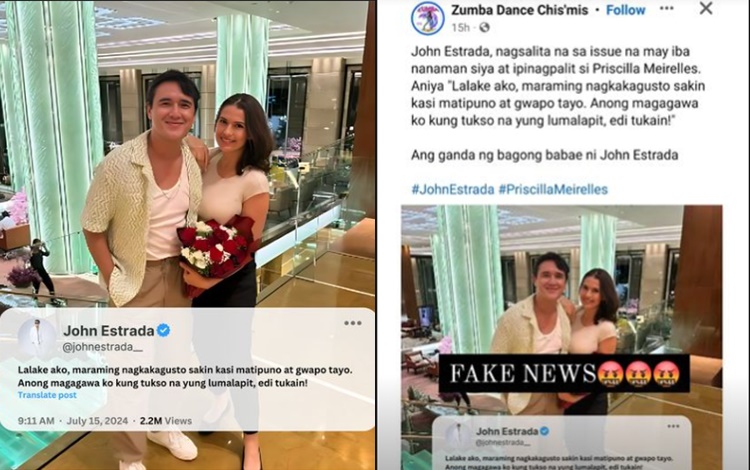Actor John Estrada recently found himself at the center of a social media storm after a Facebook page posted a fake statement allegedly made by him. The controversy began with his much-publicized vacation in Boracay and the subsequent revelation by his partner, Priscilla Meirelles, about an alleged third party involved. The bogus statement attributed to Estrada read, “Lalake ako, maraming nagkakagusto sakin kasi matipuno at gwapo tayo. Anong magagawa ko kung tukso na yung lumalapit, edi tukain!” which translates to, “I’m a man, many people are attracted to me because I’m handsome and well-built. What can I do if temptation comes close, then I indulge!”

Estrada, known for his candid personality, immediately took to social media to denounce the post as fake. He expressed his dismay and frustration over the misuse of his image and the fabricated statement. “It is disheartening to see such false information being spread. I did not make any such statement, and it is a blatant lie aimed at tarnishing my reputation,” Estrada stated in his post.
The controversy ignited following Meirelles’ disclosure on social media about the identity of the alleged third party involved with Estrada during his Boracay trip. This revelation led to a surge of public interest and speculation, making Estrada a prime target for fake news creators. The fabricated post quickly went viral, garnering numerous likes and shares, further complicating the situation for the actor.
Estrada’s reaction has sparked a broader conversation about the prevalence of fake news and its impact on public figures. Several celebrities, including Sarah Lahbati and Marian Rivera, have shown their support for Estrada by speaking out against the spread of false information. They emphasized the need for social media users to be more discerning about what they share and post online.
“This is a reminder for everyone to verify information before believing and sharing it. Fake news not only harms the individuals involved but also misleads the public,” Lahbati remarked.
The incident has highlighted the ongoing issue of fake news on social media platforms. Celebrities often find themselves at the mercy of malicious content creators who exploit their fame for clicks and shares. Such posts can cause significant distress and damage to their personal and professional lives.
In light of this, social media users are urged to be vigilant and responsible. Ensuring the credibility of sources and the accuracy of information before sharing it is crucial in combating the spread of fake news. As Estrada’s experience demonstrates, the repercussions of such malicious actions can be far-reaching and deeply damaging.

The call for responsible social media usage is more pertinent than ever. By collectively ensuring that the information we share is truthful, we can help protect individuals from the harmful effects of fake news and foster a more informed online community.
